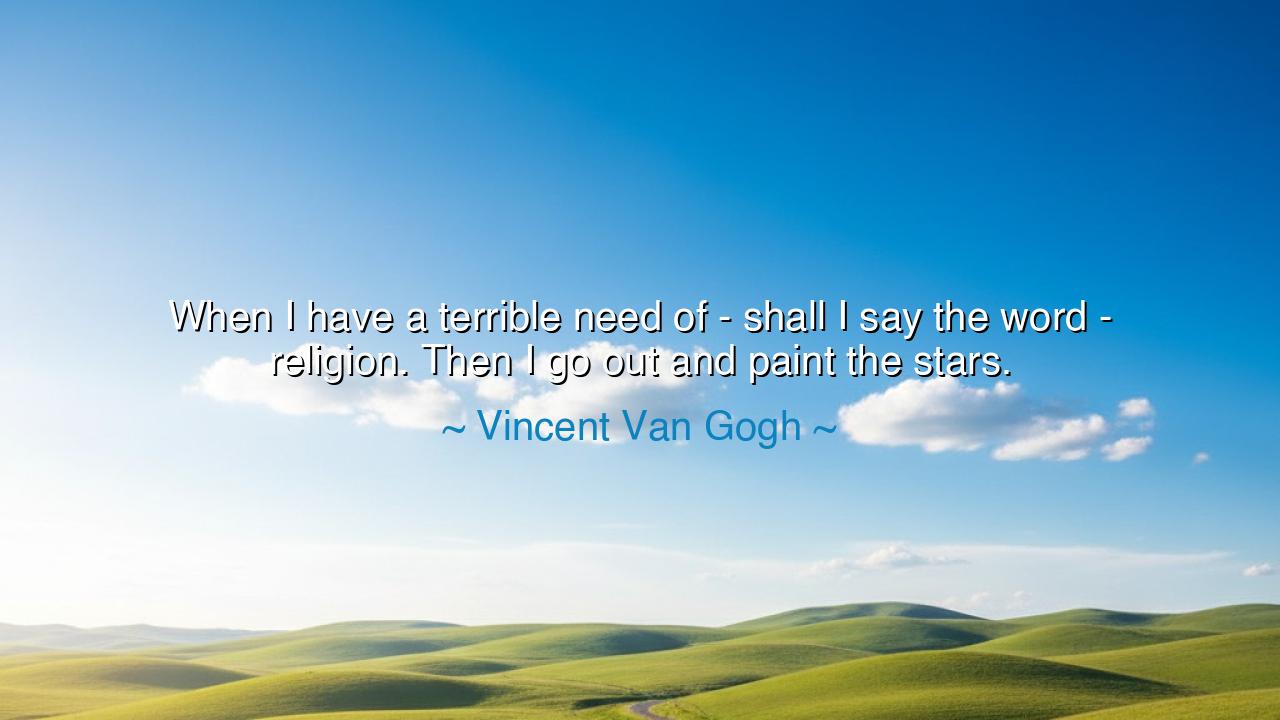
When I have a terrible need of - shall I say the word - religion.
When I have a terrible need of - shall I say the word - religion. Then I go out and paint the stars.






“When I have a terrible need of — shall I say the word — religion. Then I go out and paint the stars.” — so wrote Vincent van Gogh, the tormented prophet of color and light, whose brush spoke the language of the soul more powerfully than words ever could. These words, whispered from the depths of his longing, are not the confession of a man of doctrine, but the prayer of a man of wonder. In them lives a truth as ancient as creation itself — that the divine is not confined to temples, and that the heart can find God in the luminous silence of the night sky. When Van Gogh felt his spirit unravel, when his faith faltered beneath the weight of sorrow, he sought redemption not in creed, but in beauty — and beauty, for him, was a form of worship.
The origin of this quote lies in one of Van Gogh’s letters, written to his brother Theo, the steadfast companion of his turbulent life. In that simple line, he reveals a longing not for ritual, but for connection — a yearning to touch something infinite when human love and earthly peace seemed beyond his reach. Once, he had tried to serve as a minister of the Gospel, preaching to miners and peasants in the dark valleys of Belgium. But his compassion, too fierce and unbound by convention, was deemed madness by the churchmen of his day. Rejected by the institution he sought to serve, he turned his vocation toward art. Yet his spirit remained that of a priest — not of the altar, but of the cosmos. With his brush as his chalice, and the stars as his scripture, he painted his prayers upon the canvas of eternity.
To “paint the stars” was, for Van Gogh, to commune with the divine directly. His paintings — The Starry Night, Café Terrace at Night, Starry Night Over the Rhône — are not mere landscapes; they are visions, hymns in color, alive with trembling faith. Each swirling light is a soul in motion, each star a silent witness to eternity. In them, Van Gogh does not depict the world as it is seen, but as it is felt — alive with spirit, pulsing with unseen music. To look at his night skies is to glimpse what he himself believed: that beauty is a bridge between the human heart and the divine, and that even in despair, one can find salvation by lifting one’s eyes to the heavens.
Think of the story of another seeker, the astronomer Galileo Galilei, who turned his telescope to the stars and found there both wonder and exile. Like Van Gogh, he was condemned by those who could not see that to explore creation is also to praise the Creator. Both men were heretics in the eyes of their age, yet saints in the temple of truth. Each, in his own way, transformed science or art into a form of worship. They remind us that faith does not always wear the robes of religion; sometimes, it wears the paint-stained hands of an artist or the ink-streaked fingers of a poet.
Van Gogh’s “terrible need” was the cry of a soul that had seen both beauty and suffering too clearly. He wrestled with madness, loneliness, and unfulfilled dreams, yet through it all, he found moments of transcendence in his work. The act of creation became his prayer, his communion with eternity. When he painted the stars, he was not escaping the world but transforming it. Each stroke of yellow light upon blue darkness was his way of saying, There is still wonder here. There is still something holy in the night. His art was not merely a reflection of nature, but an offering — a sacrifice of his own pain transfigured into light.
What, then, does this quote teach us? It tells us that the sacred is never far from those who seek it sincerely. One need not enter a cathedral to pray — the open sky is enough. One need not recite words to praise — the act of creation itself is praise. When life becomes heavy, when faith falters and despair whispers its dark counsel, the soul must look upward — to the stars, to the mystery, to the infinite. Like Van Gogh, we must learn to worship through wonder, to transform our longing into art, kindness, or contemplation.
So, dear soul, when you feel that same terrible need — when your heart aches for meaning and your prayers feel unanswered — go and paint your stars. For some, this may mean painting with color; for others, with words, with deeds, with acts of love or courage. Do not seek perfection; seek presence. Lift your eyes to the night sky, and remember that even in the vast darkness, light still burns. Van Gogh’s message is eternal: that to create is to believe, and to look upon beauty with awe is to touch the face of God.
And thus, when the storms of life come, remember his example. Do not retreat into despair; step outside and behold the stars. For they are the oldest scripture, the first cathedral, the eternal promise that even amidst madness and sorrow, light endures — and through it, we may yet find our way back to the divine.






AAdministratorAdministrator
Welcome, honored guests. Please leave a comment, we will respond soon